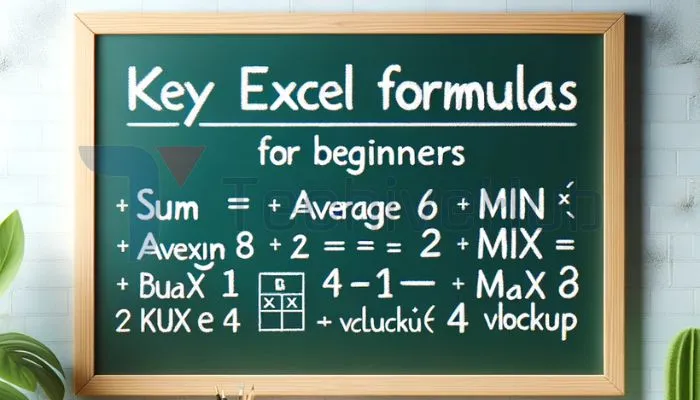Introduction
In today’s fast-paced digital world, proficiency in Excel is not just an added skill; it’s a necessity. Among the myriad of functions it offers, certain “Essential Excel Functions” stand out as fundamental tools for anyone looking to master this powerful software. Whether you’re a student, a professional, or simply someone looking to organize your personal data more effectively, understanding these key functions can significantly enhance your efficiency and productivity.
Excel, a cornerstone in the realm of data management and analysis, offers a universe of possibilities. However, it’s the mastery of certain functions that can truly unlock its potential. From simplifying complex tasks to managing vast datasets with ease, these functions are the building blocks for anyone aspiring to become adept at using Excel.
Harnessing Essential Excel Functions for Daily Life
Excel isn’t just a tool; it’s a daily companion for millions, transforming the way we handle data in both personal and professional spheres. Imagine organizing your household budget, planning a vacation, or even tracking your fitness goals – Excel’s “Essential Excel Functions” make these tasks not just possible, but efficient and effective.
Essential Excel Functions for Personal Finance Management
One of the most practical uses of Excel in daily life is managing personal finances. By utilizing basic functions like SUM and AVERAGE, anyone can keep track of expenses, savings, and budget plans. Excel turns daunting numbers into clear, manageable information, making financial planning less of a chore and more of a straightforward task.
Streamlining Routine Tasks
Whether it’s planning a weekly meal schedule or organizing a small event, Excel’s ability to sort, filter, and calculate data simplifies what could otherwise be time-consuming tasks. The ease of creating lists and tables in Excel allows for a level of organization that pen and paper just can’t match.
Boosting Work Efficiency with Essential Excel Functions
In a professional setting, Excel becomes indispensable. From compiling reports to analyzing sales data, the functions of Excel offer a level of precision and efficiency that no other tool can. Employees in various fields find Excel essential for day-to-day tasks, proving that a good grasp of its functions is more than just a skill – it’s a necessity for professional growth and success.
Essential Excel Functions in Education: Enhancing Learning
Students and educators alike find immense value in Excel. It’s not just about handling numerical data; it’s about understanding patterns, visualizing information, and developing analytical skills. Excel functions like charts and pivot tables turn abstract data into tangible insights, enhancing the learning experience.
In every aspect of our lives, Excel plays a pivotal role. It’s not just about the data; it’s about how we manage, interpret, and use that data to make informed decisions. Learning and mastering these “Essential Excel Functions” is not just a step towards better data handling; it’s a leap towards personal and professional efficiency.
Key Excel Formulas for Beginners

Embarking on your Excel journey can feel like stepping into a new world filled with endless possibilities. For beginners, mastering a few “Key Excel Formulas” is the first step towards harnessing the full power of this versatile tool. These formulas are the building blocks that make Excel an indispensable part of daily data management, both at home and in the workplace.
SUM: The Foundation of Excel Calculations
Begin your Excel adventure with the SUM function. It’s simple yet powerful, allowing you to quickly add up numbers in a range of cells. Whether you’re calculating monthly expenses or totaling sales figures, the SUM function is your go-to for basic arithmetic in Excel.
AVERAGE: Simplifying Data Analysis
Understand your data better with the AVERAGE function. This formula takes a set of numbers and returns their mean, making it perfect for analyzing sets of data like test scores, temperatures, or financial reports. It’s a straightforward way to get insights into your data without complex calculations.
MIN and MAX: Identifying Extremes
Discover the lowest and highest values in your dataset with MIN and MAX. These functions are especially useful in scenarios like identifying the best or worst sales months, or the minimum and maximum temperatures in a weather dataset. They are essential tools for quick, effective data assessment.
VLOOKUP: Connecting Data Points
As you progress, the VLOOKUP function becomes crucial. It helps you search for specific information in a large dataset. Whether you’re managing a customer database or tracking inventory, VLOOKUP saves time and effort by pinpointing the exact data you need.
IF: Decision Making Made Easy
The IF function introduces you to logical operations in Excel. It performs a specific action based on whether a condition is true or false. From budgeting to project management, IF is a versatile function that simplifies decision-making processes in your spreadsheets. These “Key Excel Formulas” are not just functions; they are gateways to efficiency and effectiveness in your daily tasks involving data. They are easy to learn, fun to use, and immensely powerful in their application. As you familiarize yourself with these basics, you’ll be well on your way to becoming proficient in Excel, ready to tackle more complex challenges with confidence.
Conclusion
As we’ve explored, Excel is far more than a mere spreadsheet tool; it’s a gateway to unparalleled efficiency and clarity in both personal and professional realms. The “Essential Excel Functions” and “Key Excel Formulas” we’ve discussed are not just features—they are catalysts for change. They empower you to transform overwhelming data into actionable insights, streamline everyday tasks, and enhance your decision-making skills.
Whether you’re just starting on your Excel journey or seeking to refine your existing skills, the path is clear. Excel is an indispensable ally in navigating the complexities of today’s data-driven landscape. By mastering these functions, you equip yourself with a skill set that transcends the ordinary, opening doors to new opportunities and heights of productivity.
So, take this knowledge and apply it. Let Excel be more than a tool; let it be your partner in crafting a smarter, more organized, and more efficient future. Your journey into the world of Excel starts now, and the possibilities are limitless.

